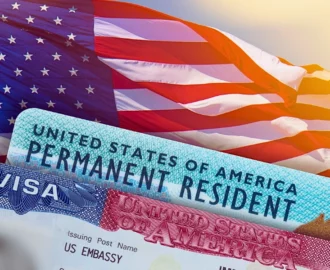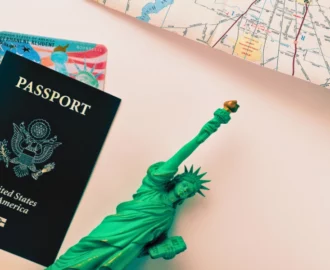The two main types of visas in the U.S. are immigrant visas and non-immigrant visas, with immigrant visas applying to individuals who wish to gain permanent residency in the country, while non-immigrant visas go to individuals who only want to stay in the country for a limited period of time, whether for work or another purpose.

Knowing more about the difference between immigrant visas and non-immigrant visas can help you determine which to apply for and what to expect with the application process.
What Is an Immigrant Visa?
If foreign nationals entering the U.S. want to live and work in the country on a permanent basis, they must apply for immigrant visas. In most cases, applying for an immigrant visa involves getting a sponsorship from either a family member or an employer who can support the person filing. However, some applicants, such as investors and those with Extraordinary Abilities on EB-1 visas, may apply.
Upon receiving an immigrant visa, recipients can begin the process of obtaining a green card that officially labels them as lawful permanent residents (LPRs) who can live and gain employment in the U.S.
Categories of Immigrant Visas
There are several immigrant visa categories that foreign nationals may apply for before becoming green card holders. These categories include:
- K-1 and K-3 Visas: While a K-1 visa allows fiancées and fiancés to marry American citizens, a K-3 visa allows spouses of U.S. citizens to become LPRs as they wait for the approval of their I-130 immigrant applications.
- IR1 and CR1 Visas: Both of these allow immigrants to enter the U.S. with the help of a sponsor with American citizenship.
- IR2, IR5, CR2, F1, F3, and F4 Visas: These visas enable immigrants to enter the country through family member sponsors, which could include parents, children, and other immediate family members.
- F2A and F2B Visas: People entering on these visas will have a sponsor who is an LPR at the time of filing.
- E1, E2, and Other Employment-Based Visas: Different types of workers could enter the U.S. with the sponsorship of employers in different industries and lines of work.
What Is a Non-immigrant Visa?
Foreign nationals can apply for non-immigrant visas if they want to enter the country on a temporary basis. They might want to enter the country for a variety of reasons, including work, education, urgent medical care, or leisure.
Non-immigrant visas won’t allow applicants to become LPRs or American citizens, but they could seek an immigrant visa later. These applicants will need plenty of supporting documentation and official authorization before they can apply for a non-immigrant visa, depending on the nature of their visit to the U.S.
Categories of Non-immigrant Visas
Like immigrant visas, there are multiple non-immigrant visa categories for which foreign nationals may apply.
For example, one common type of non-immigrant visa is the B-1 visa, which applies to domestic employees seeking work in the U.S. along with amateur and professional athletes entering the U.S. to compete.
Another type of non-immigrant visa is H-1B, which allows physicians and others in specialty occupations to enter the country for work purposes. Meanwhile, some foreign nationals may apply for an H-2A visa for temporary agricultural work or an H-2B visa for temporary work of another nature.
Students, on the other hand, could apply for F or M visas to seek education in the U.S.
If you’re not sure which category of visa to seek as either an immigrant or non-immigrant entrant, immigration legal services attorneys can help you identify and apply for the correct category.
Also, depending on the type of visa, you may need authorization from U.S. government agencies, including the Department of Labor, U.S. Citizenship and Immigration Services (USCIS), or the Student and Exchange Visitor Program (SEVIS) under U.S. Immigration and Customs Enforcement (ICE).
Challenges in Obtaining Immigrant and Non-immigrant Visas
If you’re seeking either an immigrant or non-immigrant visa in the U.S., there are challenges you may face in your path to becoming a temporary visitor or an LPR. These challenges include:
A Complex and Lengthy Immigration Process
Depending on the current situation in the country, such as the backlog of applications the government must review, along with the type of visa you want to apply for, the visa application process can be difficult to navigate and take a long time to complete.
You may need authorization from the government and plenty of supporting documentation that explains the nature of your entry into the country and proves that you can legally enter as a visitor or resident.
By taking the right steps and working with an attorney, you may be able to expedite the process and gain a faster path toward entry or citizenship.
Getting the Help of a Sponsor
Most visa applicants won’t be able to self-petition, meaning they’ll need to seek sponsorship from a qualifying individual to help them gain entry into the U.S. The specific type of sponsor the person has will depend on the visa type, and this individual could include a family member, employer, or another LPR or U.S. citizen willing to support the visa applicant.
It can be challenging finding the right sponsor to help you streamline the visa application process, but this is another area where an attorney can help.
Preparing Necessary Documentation
You will also need to ensure your paperwork is in order to successfully apply for any visa. There may be a lot of documents you need to prepare and complete with accurate information.
Types of documentation may include:
- Passport
- Birth certificates
- Photos
- Military records
- Proof of relationship to your sponsor
- Financial documents
If you fail to submit sufficient or accurate documentation, you may fail to get through the visa application process. An attorney with experience handling these types of cases may help you prepare all paperwork to ensure it’s ready for submission.
Visa Interviews
Before the government approves your visa application, you must complete an interview with an agent. This agent will ask you questions about your application and the nature of your visit to the U.S., along with your history, occupation, and family. You should take plenty of time to prepare for this interview, including answers to questions and supporting documentation that the agent can review.
An experienced immigration lawyer can help you with this and work with you to prepare for your interview.
What Are the Benefits of Hiring an Immigration Lawyer?
There are several advantages of hiring an immigration attorney to handle your case.
An immigration lawyer can lend legal knowledge to help you navigate the application process. The legal landscape is always changing when it comes to immigration law, and an attorney will keep up with it to help you comply with the latest regulations, laws, and policies in place.
You can also get help completing and filing paperwork to avoid clerical issues and mistakes when government agencies review your application. Even small errors on your application or any missing documentation could mean the difference between success and failure in your case.
In addition, you’ll learn all about what it will take for you to succeed with your case, such as how family-based immigration works if you’re entering the country with an immediate family member as a sponsor.
Know What to Look for in a Lawyer
If you want to successfully apply for either an immigrant or non-immigrant visa, and you want an attorney’s help, you must find the right lawyer to assist you based on your unique needs. Knowing what to look for when hiring an immigration lawyer in Chicago can go a long way in helping you achieve success with your application.
Not all immigration lawyers are the same—some might be more capable of handling your case than others.
For instance, you should seek the help of a lawyer who has experience handling cases similar to yours. Say you’re entering the country as a non-immigrant for work purposes; this would warrant the help of an attorney who knows how to handle non-immigrant cases.
Look for an attorney with plenty of experience. A good attorney will have years of experience in his or her practice area, and a large firm will have plenty of people on staff to help with handling client cases, including paralegals and assistant attorneys. You should know exactly who will help you handle your case, whether it’s the attorney you initially discuss your case with or other staff.
Understanding the Difference Between Immigrant and Non-immigrant Visas
If you plan on entering the country for any reason, it helps to know which visa you need to apply for, whether it’s an immigrant or non-immigrant visa. Seek the right category and properly prepare your application accordingly.




